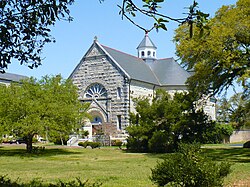Convent and Academy of the Visitation | |
 The east building was built in 1855 and serves as the main entrance to the convent. | |
| Location | 2300 Spring Hill Avenue Mobile, Alabama |
|---|---|
| Coordinates | 30°41′37.80″N88°5′34.56″W / 30.6938333°N 88.0929333°W |
| Area | 11 acres (4.5 ha) |
| Built | 1855; 1895; 1899 |
| Architect | James Henry Hutchisson |
| Architectural style | French Renaissance, Romanesque Revival, Gothic Revival |
| MPS | Historic Roman Catholic Properties in Mobile Multiple Property Submission [1] |
| NRHP reference No. | 91000844 [2] |
| Added to NRHP | April 24, 1992 [2] |
The Convent and Academy of the Visitation, properly known today as the Visitation Monastery, is a historic complex of Roman Catholic religious buildings and a small cemetery in Mobile, Alabama, United States. The buildings and grounds were documented by the Historic American Buildings Survey in 1937. They were added to the National Register of Historic Places on April 24, 1992 as a part of Historic Roman Catholic Properties in Mobile Multiple Property Submission. [2] It, along with the Convent of Mercy, is one of two surviving historic convent complexes in Mobile.






